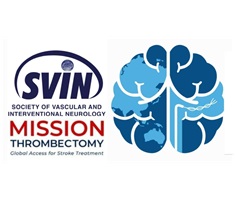 The Society of Vascular and Interventional Neurology (SVIN) recently announced the publication of a “significant” research paper in the journal Stroke, presenting the Mechanical Thrombectomy Access Score (MTAS)—a “pivotal advancement” in interventional neurology and stroke care with far-reaching global implications, according to an SVIN press release.
The Society of Vascular and Interventional Neurology (SVIN) recently announced the publication of a “significant” research paper in the journal Stroke, presenting the Mechanical Thrombectomy Access Score (MTAS)—a “pivotal advancement” in interventional neurology and stroke care with far-reaching global implications, according to an SVIN press release.
This MTAS research aims to provide a quantitative framework to evaluate access to mechanical thrombectomy and address critical healthcare infrastructure disparities in high- and middle-income countries. The study highlights common opportunities for improving care and access worldwide, despite the varying challenges in these countries. The SVIN’s recent release notes that the Stroke paper delves into the detailed utilisation of the global MTAS as an “innovative and comprehensive tool” for better understanding the impediments to accessing thrombectomy on a global scale.
By employing the MTAS, the paper presents a methodical and impartial approach to pinpointing the primary barriers that hinder individuals from accessing thrombectomy across high-, low- and middle-income countries. It emphasises how the MTAS can serve as a valuable resource for healthcare systems, policymakers and public health professionals to confront these challenges effectively. The research also underscores the “immense potential” of the MTAS in enhancing and streamlining stroke care and thrombectomy workflow, as well as broadening thrombectomy access—particularly in underserved regions. Additionally, it highlights the significance of ongoing refinement and validation of the MTAS to ensure its efficacy in diverse healthcare settings and its potential impact on the global battle against stroke, according to the SVIN.
“We are excited to share the findings of this impactful research, which has the potential to shape the future of stroke intervention and care on a global scale,” said SVIN president Thanh N Nguyen (Boston University Chobanian and Avedisian School of Medicine, Boston, USA).
Dileep Yavagal (University of Miami, Coral Gables, USA) and Santiago Ortega-Gutierrez (University of Iowa Hospitals and Clinics, Iowa City, USA), the project leads for the MTAS research, added: “This paper not only addresses disparities in access to mechanical thrombectomy but also highlights the benefits of improving access to lifesaving interventions.”
“The Mechanical Thrombectomy Access Score is a groundbreaking tool that embodies the mission and vision of the SVIN Mission Thrombectomy programme,” stated Fawaz Al-Mufti (New York Medical College, New York City, USA), global chair for the SVIN Mission Thrombectomy programme. “This innovative approach has the potential to revolutionise global access to lifesaving thrombectomy procedures, particularly in underserved regions. Addressing barriers to care, MTAS aligns with the Mission Thrombectomy programme’s vision to improve outcomes for stroke patients worldwide through comprehensive and equitable treatment.”









